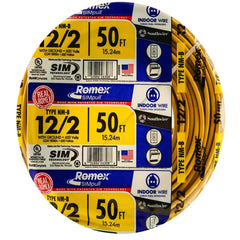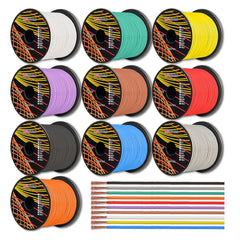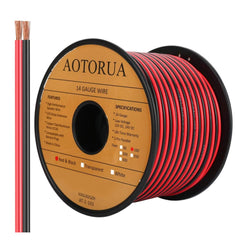Your Cart is Empty
Free shipping over 12.99 丨 30-Day Money-Back Guarantee 丨shipping: 2-3Days
Free shipping over 12.99 丨 30-Day Money-Back Guarantee 丨shipping: 2-3Days
Choosing the right tools for the job is not always easy, especially when you need to get the job done efficiently and quickly. Electrical cables are important for many projects in both domestic and industrial applications. They help deliver electricity to the parts of your home or workplace that need it and can't function without it. Often, the choice and decision of which wire to use can become complicated and hinder progress on certain projects. If not done correctly, the whole house of cards could come tumbling down, and no one wants that. Below, we've taken the initiative and selected some of the most prominent and well-received wire options for 2022 at an affordable price.
Wires suitable for the job are not only good electrical conductors but also durable bastions that will stand the test of time and frequent use. The list below contains only the best wires in terms of quality and standard, and reading our selection should help make your search for the right wireless of a hassle. Let's have a look!

Southwire 28828222 50' 12/2 wire is an easy-to-install, quality solution to all your residential wiring problems. Perfect for exposed and concealed work, this cable is typically used primarily for wiring homes, shops and shops.
Southwire 28828222 50' 12/2 cord simplifies installation and reduces labour and material costs while helping to create a safer working environment. This cord can be run through air voids in brick or tile walls, which are not wet areas. Its tried and true nature and versatile use make this option the best overall on our list.

The Tyumen 40FT 18 gauge wire is an excellent product, well suited for wiring monochrome LED strips, low voltage monochrome LED strips, bulbs and luminaires. The wire is supplied as a stranded wire wrapped in PVC. It is versatile and is used for a wide range of DC electrical connections, low voltage cables and low loss home or car audio installations.
The wire offers good protection against moisture and is very convenient and easy to install. It is suitable for domestic applications as well as automotive, school, church, auditorium or commercial environments.

This 16 AWG wire bumper pack from GS Power includes 10 x 100 foot rolls. This is a complete set of wires for any hobby or automotive enthusiast. For your convenience and ease, this individual copper-clad aluminum 16 gauge wire is fully insulated with flexible PVC and colour coded. This harness is perfect for 12 volt car stereo equipment, home theatre and low voltage LED lighting. This 16 gauge wire is available in a variety of different package sizes and colours. Rather than bare, bare copper wire, this kit safely meets all your wiring requirements by providing stranded wire with wrapped material. The variety of colours makes it easy to create new stereo connections and makes almost everything aesthetically pleasing and easy to distinguish.

Topcon 20 gauge solid wire is a very malleable and adaptable wire that is easy to cut and crimp, carrying all your electrical charges in an orderly fashion. The wire has good abrasion resistance and is resistant to substances such as oils, solvents and chemicals.
This solid wire also has a PVC insulation that allows it to withstand temperatures of up to 80 degrees Celsius. These beautifully colour-coded wires are easy to handle and use and will keep you happy throughout your project.

Plusivo 24 gauge solid core connecting wires are the perfect wire for wiring circuits on breadboards or prototype boards. The wire fits easily into the breadboard holes and has PVC insulation, making it extremely durable and flexible in most situations.
Made from tinned copper, Plusivo connecting wires are easy to solder, offer full protection against corrosion and provide the same electrical conductivity as bare copper. 24 gauge wire options are available in a variety of colours for easy identification and colour coding. The wire is contained in a box housing to keep your workspace organized.

MILAPEAK 40ft 18AWG gauge wire is a convenient and adequate wiring solution. These wires have tinned copper strands to protect them from corrosion and make them easier to solder. They are also very flexible and easy to install, and can be cut to any length you need.
The wire consists of 34 thin wires that are twisted together, the thin copper strands are perfect for conducting electricity and are very easy to solder. The wire is widely used for all monochrome LED strips, various DC electrical connections including CB radios, electronics, appliances and equipment, transformers, motor lead connections and other low voltage products.

Haerkn Electrical 22 AWG 22 gauge silicone wire is a super flexible and efficient wire that is perfectly suited to your needs. With 60 strands of 0.08 mm tinned copper wire, the wire is corrosion resistant and will last longer than your best expectations.
Haerkn Electrical 22 AWG 22 gauge silicone wire is heat resistant, durable and easy to install. It is suitable for many wiring scenarios and is a very affordable option if you need it.

The AORTORUA 100FT 14/2 connection wire is a highly flexible wire with excellent electrical conductivity and high mechanical strength properties. This wire is widely used in lighting, household appliances, electrical appliances, instrumentation, electrical wiring, automotive anti-theft, electronics, lighting, appliances, etc.
AORTORUA 100ft 14/2 gauge connecting wire is easy to strip and cut to any length you need. It is wrapped around a hard plastic spool to make distribution easy and comes in two colours to make it easier to distinguish polarity and numbered markings to ensure accuracy.
When it comes to any electrical product, the last thing you want is to buy the wrong wire that is completely inappropriate for the purpose for which it was purchased. No one wants to pay for cables and wires that don't perform as required and expected. Paired with the correct wire connectors, the wires bring light and power into the space where it is needed. Whether you are installing a new ceiling fan or connecting some lighting to a new storefront, electrical wiring will get the job done and ensure that the house lasts.
There are many different brands and marketers in this field and most of the time, choosing the right wire from all the numbers is difficult and utterly confusing. To make your task easier, we've checked the list of factors that are most likely to be considered before you buy.
Below, we have compiled a list of some of the important things you need to keep in mind when buying wires and cables from the wide selection available.
Typically, you will find wires and cables made from aluminum or copper. These materials are most suitable for wire and cable as they provide the necessary conductivity required for performance. They are also widely used and accepted because of their low cost and abundance. When you are in the market for electrical wiring, try to ensure that you confirm that the product you choose is made from quality materials and meets industry standards.
If you need electrical wiring for the wiring in your home, the copper wire will suit you best. Bare copper is susceptible to corrosion, while tinned copper will prevent corrosion. Copper is more conductive than aluminum, but it is also heavier and more expensive. If your project requires long-distance applications, then you should probably opt for the lighter aluminum wire, which is usually available at a more affordable price.
After deciding which wire you want to buy, you need to find out if the cable supplier can supply you with all the wires in the right length you need. One effective way to do this is to find out if the supplier offers bespoke purchase orders. If they do, it will give you more scope to adapt your order to your situation. This will prevent you from ending up with too short or too much cable.
This is the diameter of the guide body itself. This value is specified by the American Wire Gauge System and is a very important consideration when purchasing the wire you are going to use. Basically, the smaller the wire, the larger the gauge. It is very important to choose the right wire for the amperage of your circuit, otherwise you run the risk of short circuits and fires. Obviously, it is very important to choose the correct gauge wire.
This is how it works: the current carrying capacity of a wire is determined by the gauge of the wire. Once you've chosen a wire with the gauge that will deliver the amperage needed for your situation, you're safe.
Cables made from quality materials that meet industry standards are likely to have proper and recommended insulation. It is always a good idea to check that the wire or cable you are about to purchase is approved to be waterproof, heat resistant and fire resistant. If all three of these main factors are included and the wire you choose is waterproof, heat resistant and fire retardant, then you will find yourself with a quality wire that meets insulation standards.
Typically, different types of wire offer different levels of wire flexibility. Depending on what you need the wire for, you can choose between the following options.
Another very important thing to remember is the label. You must make sure that the cables and wires have the correct labels printed on the outer sheath. If these are not present then it may be safer to try another product or supplier. These labels ensure that you are handling the correct equipment and making the correct connections, which is why every cable you use needs to be correctly labelled.
Some of the main things that should be listed on the cable should include: voltage, American Wire Gauge (AWG) and insulation type (THHN or THWN). These details are important and necessary to avoid mistakes or errors. Colour coded insulation or sheathing can also help you to ensure that the correct wire is used.
When working on electrical projects, it is advisable to use different coloured wires in electrical components. This will not only help you (the end user) but also anyone who may need to repair the component in the future by creating variations and understanding the purpose of each wire. If this is your goal, then you will need access to a wide range of wire colours. Fortunately, there are many brands that offer this solution.
Before deciding which wire to purchase, you need to ask yourself a few questions. These questions will help you easily narrow down the perfect wire for your needs. The following are some of these questions.
Answering these questions will help you avoid buying a piece of wire that is useless for the purpose for which you bought it, and greatly simplify the process by giving you better direction.
A: Generally speaking, for the wiring of your home, you will usually use 12 or 14 gauge wire. Your equipment will require 10, 8 or 6 gauge wire. Appliances and equipment that require a lot of amperages (such as water heaters, cookers, dryers and air conditioning units) usually require a larger gauge.
A: These terms are often used interchangeably, but they do not mean the same thing. The wire is a single strand of flexible metal that conducts electricity. A wire is a separate conductor within a sheath, usually insulated or bare. A cable is a combination of two or more wires or other conductors that are combined within a sheath.
A: Most wiring in modern homes takes the form of non-metallic (NM) cables. These types of cables usually contain two or more individual wires encased in a protective plastic jacket.
Comments will be approved before showing up.